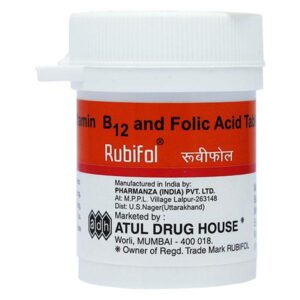FOLIC ACID + VITAMIN B12 (CYANOCOBALAMIN)
Folic Acid: Drug: Folic Acid
Folic acid is a synthetic form of vitamin B9, also known as folate. It is an essential nutrient necessary for the production and maintenance of new cells in the body. Folic acid is available in various forms, including tablets, capsules, and injections.
Use:
Folic acid is primarily used for the prevention and treatment of folate deficiency. It is prescribed to pregnant women to prevent certain birth defects of the baby’s brain and spine, known as neural tube defects. Folic acid may also be recommended for individuals with certain medical conditions such as anemia, kidney dialysis, liver disease, alcoholism, or a poor diet.
Mechanism of Action:
Folic acid plays a critical role in the synthesis and repair of DNA, RNA, and proteins in the body. It acts as a coenzyme in various enzymatic reactions involved in cell division, growth, and metabolism. By providing an adequate supply of folate, folic acid helps in the production of red blood cells, formation of genetic material (DNA), and proper functioning of the nervous system.
Dose:
The recommended daily dose of folic acid varies based on age, sex, and medical condition. For preventing neural tube defects during pregnancy, the usual dose is 400 to 800 micrograms (mcg) per day. For the treatment of folate deficiency, the dose may range from 200 to 1000 mcg per day, depending on the severity of the deficiency. It is important to follow the dosage instructions provided by your healthcare provider.
Side Effects:
Folic acid is generally safe and well-tolerated when taken at the recommended doses. However, some individuals may experience mild side effects, including nausea, loss of appetite, bloating, gas, and a bitter or unpleasant taste in the mouth. In rare cases, allergic reactions may occur, characterized by rash, itching, swelling, dizziness, or difficulty breathing. If any severe or persistent side effects are observed, it is important to seek medical attention promptly.
It is worth noting that excessive use of folic acid supplements may mask symptoms of vitamin B12 deficiency, a condition that can lead to nerve damage if left untreated. Also, folic acid supplements should not be used as a substitute for a balanced diet. If you have any concerns or questions about the use of folic acid, consult your healthcare provider.
Vitamin B12 (cyanocobalamin): Vitamin B12, also known as cyanocobalamin, is a water-soluble vitamin that is essential for the proper functioning of various bodily processes. It plays a crucial role in the production of red blood cells, DNA synthesis, and the maintenance of healthy nerve cells.
Vitamin B12 is primarily used in the treatment and prevention of vitamin B12 deficiency, which can occur due to various factors such as poor diet, malabsorption conditions, or certain medications. It is also used in the management of pernicious anemia, a type of anemia caused by a lack of intrinsic factor that is needed for vitamin B12 absorption.
The mechanism of action of vitamin B12 involves its interaction with intrinsic factor, a protein secreted by the gastric parietal cells, in the stomach. Intrinsic factor binds to vitamin B12 in the stomach and helps facilitate its absorption in the small intestine. Once absorbed, vitamin B12 is transported to various tissues and cells, where it participates in numerous enzymatic reactions.
The dosage of vitamin B12 can vary depending on the individual’s age, medical condition, and the severity of the deficiency. Typically, oral doses range from 1000 to 2000 mcg daily for individuals with a deficiency. In cases of pernicious anemia, injections of vitamin B12 are often required, with the dosage and frequency determined by the healthcare provider.
While vitamin B12 is generally considered safe and well-tolerated, it can cause some side effects. Common side effects include mild nausea, diarrhea, or upset stomach. In rare cases, allergic reactions, such as itching, swelling, or breathing difficulties, may occur. If any severe side effects are experienced, medical attention should be sought immediately.
It is important to note that vitamin B12 supplementation should only be used under the guidance of a healthcare professional, as they can determine the appropriate dosage and monitor any potential interactions with other medications or medical conditions.

